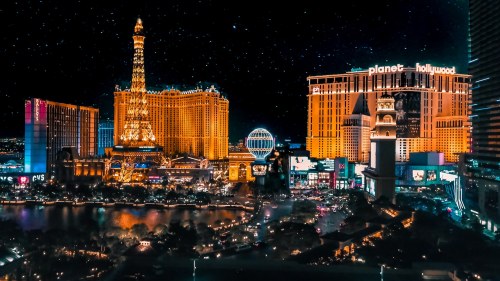Global Cities: The Las Vegas Lesson

What defines a global city? Though the parameters are nebulous, Las Vegas' niche in the world of gambling gives it a special spot in the world economy.
My colleague, Juliana Kerr Viohl, has called my attention to an article from the Las Vegas Sun entitled “The Next Chapter: Las Vegas Becomes a Global City.” Actually, the words “global city” are a headline writer’s hype: the article itself doesn’t mention them. But it’s an interesting piece that stimulates some thought on global cities—what they are, how they reach that status, and why some cities, not just Las Vegas but similar Midwestern cities, can be substantial cities without being global, or can be global without being substantial.
The article was written by Robert Lang, an urban scholar at Virginia Tech, now also director of the Brookings Mountain West institute at the University of Nevada at Las Vegas. Lang is best known for his work on megapolitan regions—big sprawling metropolitan regions linked by geography or economies: the northeast corridor from Washington to Boston is an example.
Lang shuns any “global city” labels and focuses on basic urban needs “essential for our growth.” Vegas already has a good airport and a big performing arts center, he says. But it needs an interstate highway to Phoenix about 300 miles away, a medical school, a stadium or other center with more than 40,000 seats, and a light rail system to ease downtown congestion.
These are fairly modest ambitions by the standards not only of the nation’s true global cities—New York, Chicago and Los Angeles—but by the heights scaled years ago by Austin, Indianapolis, San Francisco, Columbus, Boston, Seattle, Portland or Milwaukee – all cities in the same 600,000-to-800,000 population range as Las Vegas. The Las Vegas metropolitan region holds about 2 million people—half the size of Boston or San Francisco but actually bigger than Indianapolis or Columbus.
So, has Las Vegas a chance of fulfilling the headline writer’s whimsy to become a global city? Yes, in a way—and so do the other mid-ranking cities, the Portlands and Indianapolises, on that list.
The theorists of global cities, led by Saskia Sassen, say that such cities “are command points in the organization of the world economy, key locations for specialized service firms…” What this means is that these cities might not be manufacturing centers any more, but they have the business services – the lawyers, accountants, consultants, traders and the like – which sit at the center of the web of global business and make it work.
The big global cities simply have more of these services than anybody else. London, New York, Paris and Tokyo rank at the top. Chicago, Singapore, Toronto, Seoul, and similar cities are just below. The Global City Index, compiled by The Chicago Council on Global Affairs with the help of A.T. Kearney, lists 65 global cities. Only eight U.S. cities made the cut. Las Vegas is nowhere near the list.
But as Sassen and others say, almost every city is a global city these days. It has branch offices of big global law firms. It has immigrants and foreign students in its universities and exports to distant lands. What happens in China can affect them, just as it affects Chicago.
And then there’s the question of specialization. Many writers give Chicago high marks for its diversified economy, with such a variety of industries and strengths that it survived the industrial collapse that doomed Detroit and other big industrial cities. But Aaron Renn, host of The Urbanophile blog, and other critics have said that this diversity can be a handicap. In the global economy, they say, it’s necessary to have a specialization, a niche, a real strength that no other city has. It’s this specialty, they say, that makes the world beat a path to a city’s doorway.
London and New York specialize in finance. Milan and Paris specialize in fashion. Los Angeles specializes in entertainment. San Francisco has Silicon Valley. Chicago specializes in—what? Nothing, really.
Smaller cities can have this specialization, too. If you’re in the global motorcycle business, the expertise you need lives in Milwaukee. Detroit will survive if it can turn itself into a world center of auto research. Some cities, like Toronto or Sydney, dominate their country: if you want to do business in Canada or Australia, you probably need to be in those cities.
Las Vegas pretty much does one thing for a living, but it’s a true specialty. The city is one of the world’s gambling capitals. This means it’s also a center of gambling expertise. Anyone going into big-time gambling would do well to get advice, financial and legal, in Las Vegas.
In addition, Las Vegas is a major exporter. I’m not talking about foreign purchases of Vegas-made slot machines, although it does that, too. But the Las Vegas casinos and night clubs, like the New York theaters and Chicago traders and universities everywhere, sell services to customers who come from all over the world to buy them. In other words, Las Vegas takes in the world’s money as surely as if it was selling steel or cars.
Great cities don’t have to be pleasant cities: Cairo, Mumbai, and Beijing are all great cities but hard places to live. And global cities don’t have to be great cities. Las Vegas may or may not get that highway or medical school that Lang suggests, but so long as the world’s citizens want to play the slots or see a show, it will have its own niche in the global economy.

